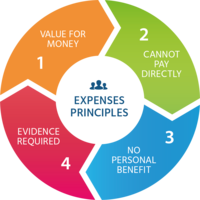University air travel should be arranged in line with the value for money principle. This usually means economy class and wherever possible, air travel should be pre-booked through Key Travel and paid for directly through the University.
Business or Club Class travel should always be avoided unless they prove to be a cheaper alternative than economy class, or when all of the following conditions are met:
- The Head of Administration or Head of Department deems it appropriate; and
- the flight is scheduled to take longer than 4 hours; and
- the person flying is required to attend a meeting, deliver a lecture, examine a viva or similar within 4 hours of arrival.
In certain circumstances, an individual may wish to amend their air travel booking to fit with personal requirements. This may be permitted with department approval as long as it is in accordance with principle 3 and no personal benefit is gained.
Additional expenses incurred when extending travel for personal reasons (accommodation, meals etc.) should not be reimbursed.
University travel insurance may not offer suitable cover for personal travel. Travellers should ensure they have adequate personal travel insurance in place for non-University activities. Refer to the University insurance web pages for further details.
Examples of what can and should not be claimed:
| þ |
If the claimant has booked/upgraded their travel because they prefer to fly in business or first class and are only reclaiming the cost of an economy fare (therefore paying for the upgrade themselves), under Principle 1, value for money is received. If submitted through expenses, the department should only reimburse to the value of an economy fare. Receipt/proof of purchase and proof of alternative economy class fare is required as evidence. |
| þ |
Alternative airports can be used to incorporate personal holiday into travel schedule but departments should only reimburse value of return flight to location required for University business to ensure under Principle 3, that no personal benefit is received. Any additional cost difference should be covered by individual. Receipt/proof of purchase and proof of required business travel costs (prior to personal changes) and explanation that change of location is due to personal travel is required as evidence. |
| þ |
Business class travel on medical grounds. Under Principle 1, these costs are necessary. Flights should be booked by Key Travel in the first instance, but may be claimed through expenses if not possible. Evidence (medical certificate etc) should be submitted to support claim. |
| þ |
Travel cost of spouse/partner, guest or family member because they are conducting essential University business requirement or have special skill (interpreter etc). Under Principle 3, no personal benefit received. Flights should be booked by Key Travel in the first instance, but may be claimed through expenses if not possible. Departmental approval must be given in writing prior to arranging travel. Evidence of this, with business justification for accompanied travel, must be supplied to support expenses claim. |
| ý |
Should not be claimed. Travel cost of spouse/partner to accompany individual at function attendance hosted by third parties. Under Principle 3, a personal benefit is received. Any expense claims for spouse or partner costs are not allowable. |
| ý |
Should not be claimed. Unnecessary flight upgrades. The class of flight booked should be appropriate to the duration and purpose of travel to ensure value for money. |
| þ |
Essential travel costs of spouse/partner where presence is essential to co-host a series of University functions. Under Principle 3, this is for business purposes only. Flights should be booked by Key Travel in the first instance, but may be claimed through expenses if not possible. Departmental approval must be given in writing prior to arranging travel. Evidence of this, with business justification for accompanied travel, must be supplied to support expenses claim. |



